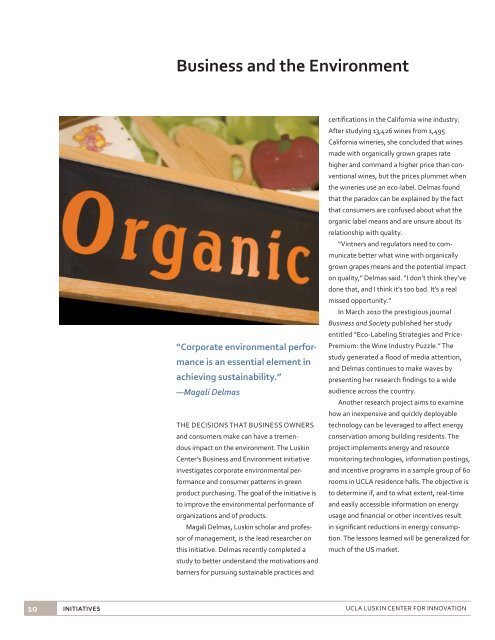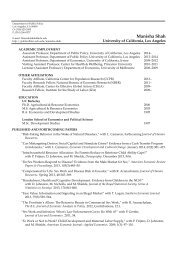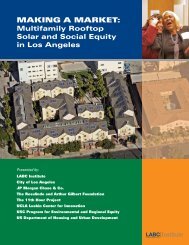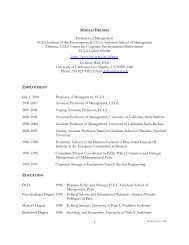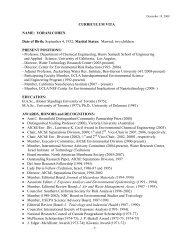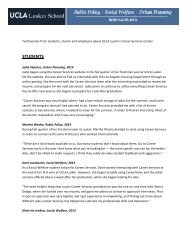Director's Report 2011.pdf - UCLA Luskin School of Public Affairs
Director's Report 2011.pdf - UCLA Luskin School of Public Affairs
Director's Report 2011.pdf - UCLA Luskin School of Public Affairs
You also want an ePaper? Increase the reach of your titles
YUMPU automatically turns print PDFs into web optimized ePapers that Google loves.
Business and the Environment<br />
“Corporate environmental performance<br />
is an essential element in<br />
achieving sustainability.”<br />
—Magali Delmas<br />
The decisions that business owners<br />
and consumers make can have a tremendous<br />
impact on the environment. The <strong>Luskin</strong><br />
Center’s Business and Environment initiative<br />
investigates corporate environmental performance<br />
and consumer patterns in green<br />
product purchasing. The goal <strong>of</strong> the initiative is<br />
to improve the environmental performance <strong>of</strong><br />
organizations and <strong>of</strong> products.<br />
Magali Delmas, <strong>Luskin</strong> scholar and pr<strong>of</strong>essor<br />
<strong>of</strong> management, is the lead researcher on<br />
this initiative. Delmas recently completed a<br />
study to better understand the motivations and<br />
barriers for pursuing sustainable practices and<br />
certifications in the California wine industry.<br />
After studying 13,426 wines from 1,495<br />
California wineries, she concluded that wines<br />
made with organically grown grapes rate<br />
higher and command a higher price than conventional<br />
wines, but the prices plummet when<br />
the wineries use an eco-label. Delmas found<br />
that the paradox can be explained by the fact<br />
that consumers are confused about what the<br />
organic label means and are unsure about its<br />
relationship with quality.<br />
“Vintners and regulators need to communicate<br />
better what wine with organically<br />
grown grapes means and the potential impact<br />
on quality,” Delmas said. “I don’t think they’ve<br />
done that, and I think it’s too bad. It’s a real<br />
missed opportunity.”<br />
In March 2010 the prestigious journal<br />
Business and Society published her study<br />
entitled “Eco-Labeling Strategies and Price-<br />
Premium: the Wine Industry Puzzle.” The<br />
study generated a flood <strong>of</strong> media attention,<br />
and Delmas continues to make waves by<br />
presenting her research findings to a wide<br />
audience across the country.<br />
Another research project aims to examine<br />
how an inexpensive and quickly deployable<br />
technology can be leveraged to affect energy<br />
conservation among building residents. The<br />
project implements energy and resource<br />
monitoring technologies, information postings,<br />
and incentive programs in a sample group <strong>of</strong> 60<br />
rooms in <strong>UCLA</strong> residence halls. The objective is<br />
to determine if, and to what extent, real-time<br />
and easily accessible information on energy<br />
usage and financial or other incentives result<br />
in significant reductions in energy consumption.<br />
The lessons learned will be generalized for<br />
much <strong>of</strong> the US market.<br />
10 INITIATIVES<br />
<strong>UCLA</strong> <strong>Luskin</strong> Center for Innovation


